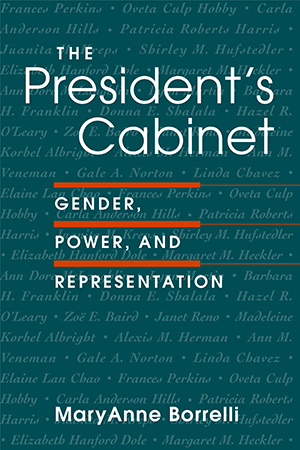Are female office holders most acceptable when they most resemble men? Why has a woman never led the Department of the Treasury, or Defense, or Veterans Affairs? Reflecting on these and similar questions, MaryAnne Borrelli explores women's selection for—and exclusion from—U.S. cabinet positions.
Borrelli considers how the rhetoric employed in the selection and confirmation of secretaries-designate establishes gendered expectations for the performance of nominees once they are in office. Analyzing the career paths of secretaries appointed from the 1930s through the first year of the George W. Bush administration, she demonstrates how gender shapes political judgments—by presidents, senators, and the nominees themselves—to reflect consistently masculine ideas about who should rule and how power should be exercised in the USA.
MaryAnne Borrelli is associate professor of government at Connecticut College. Her publications include The Other Elites (coedited with Janet Martin).
"Borelli tackles an important subject.... The questions raised and the findings are sure to be of interest to scholars for years to come."—Alana S. Jeydel, Journal of Politics
"An important contribution to the literature.... Borelli's book is accessible to presidency scholars unfamiliar with the field of gender politics and to gender politics scholars unfamiliar with presidency research.... Provide[s] a valuable lesson about gender and cabinet politics as well as how to combine solid theory with empirical evidence to advance knowledge."—Elizabeth Bennion, Congress and the Presidency
"MaryAnne Borrelli effectively bridges the gap between presidential scholarship and gender studies, utilizing gender as a robust analytical tool in studying the president's cabinet.... The President's Cabinet deserves to be widely read.... I highly recommend this book to all scholars of the presidency, the executive branch, and women in politics, as well as to an advanced general audience."—Laura van Assendelft, Perspectives on Politics
"Borrelli's examination of the gendered nature of the cabinet nomination and confirmation process offers a distinctive and compelling analytical perspective.... This is an important contribution to scholarship on the U.S. presidency, the federal executive, and women in politics."—Karen Hult






